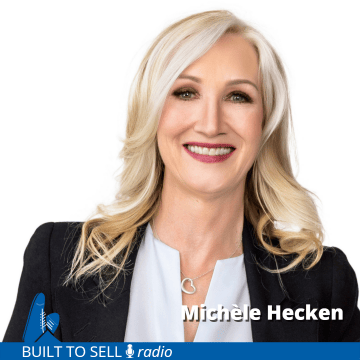About this episode
Michèle Hecken built Alpha Translations up to $4.4 Million (USD) in revenue and almost a million dollars in EBITDA before she sold it in 2019 for $6 million cash (6.7 x normalized EBITDA).
It was a fantastic exit for Hecken who got her start in University translating legal contracts from German to English.
Hecken’s episode features one value bomb after the next, including:
- A definition of “off-boarding” and why every founder needs to do it.
- How Hecken differentiated herself with time-zone arbitrage.
- How to get your employees to verify their own work.
- How to overcome “delegator’s guilt”.
- The extraordinary power of peer groups.
- How to be the “Chief Energy Officer” for your company.
- The important role industry conferences play in finding an acquirer.
- How to get an all-cash offer and avoid the earn-out trap.
- Why you need a trophy to remind yourself of what you have accomplished.
- How to overcome the uneasy feeling of living off your capital.
Check out our article on The Downside Of “Foxhole Leadership.
Show Notes & Links
(04:27) Michele Hecken: “There was a TV series that was really popular in North America, called Quantum Leap, and they were bringing that show to Germany.”
(05:55) Michele Hecken: “I had read an article about this lady who lived in Australia, and who was a translator. … and she would spend all day at the beach till about 3:00 p.m, and that’s when she’d go home and start translating because her clients in the US were waking up at that time.”
(07:11) Michele Hecken: “Translations are an afterthought, “Oh, by the way, we need this in a different language.” So that was what I always called my purple cow after Seth Godin’s book, and that’s what happened.”
(16:55) John Warrillow: “When you started off, your point of differentiation was times on arbitrage or purple cow, how did that evolve by the time you became a multi-million dollar company? What was your… We call it monopoly control, what was your enduring point of differentiation as you became a much larger company?”
(19:47) Michele Hecken: “We did have some times where we needed to strike some deals with our translators, specifically during the Lehman Brothers Crisis, 2007, 2008, that was a really tough cash flow year for us, and just a tough year in general.”
(24:18) Michele Hecken: “Right. And what I did know is that my company was fantastic, that my team was amazing, but I wasn’t the CEO, as the CEO, you’re really the Chief Energy Officer, you’re the chief of culture, that’s what drives and motivates your entire team.”
(29:28) Michele Hecken: “I went to a Language Industry Conference in Poland, actually in August 2018, and I talked to some of my peers, and one person, specifically, who I have known for twenty-somewhat years.”
(33:12) Michele Hecken: “And then also on the earn-out side, which, I heard from other EOs and other entrepreneurs that a lot of times, they’ve told me that while they didn’t stay long enough, so they didn’t get it, or that it felt like a carrot.”
(44:04) Michele Hecken: “Her name is Heather Barnhouse at Dentons, and she just held my hand through it, she did an amazing job, because she did well, and yeah, she was just fantastic”
(45:01) Michele Hecken: “It’s funny, it took me a while to give myself permission to spend some of the money, I really didn’t understand it, and I know some other people I’ve spoken to have, have felt that same way. It’s still feels, I have no concept of it. So one of the things on my dream board that I had was this Rolex watch that I wanted to get myself, and I did, eventually I got it.”

About Our Guest
Michèle Hecken is a seasoned entrepreneur and business leader with over 25 years of experience running a global company that she started at 22.
After selling her company in 2019, Michèle did not retire to the Italian countryside, as she threatens to do consistently. Instead, she is about to finish writing her book focused on enabling high-achieving entrepreneurs to design and live their best life.
“My passion is elevating high achieving entrepreneurs to design and lead their best life and business.
We may have several businesses, but we only have one shot at creating and living the life of our dreams. As entrepreneurs, who is in a better position to do that than us? Yet so many of us are burning out and waiting for joy and happiness later.
I believe in business for good. It has been and will be entrepreneurs that elevate the world and make it a better place. I’m here to elevate the lives of entrepreneurs while doing so.
We are not “normal” anyway, so let’s create and live our best Fun & Fearless Life!”
Connect with Michèle:
Michèle’s Website


